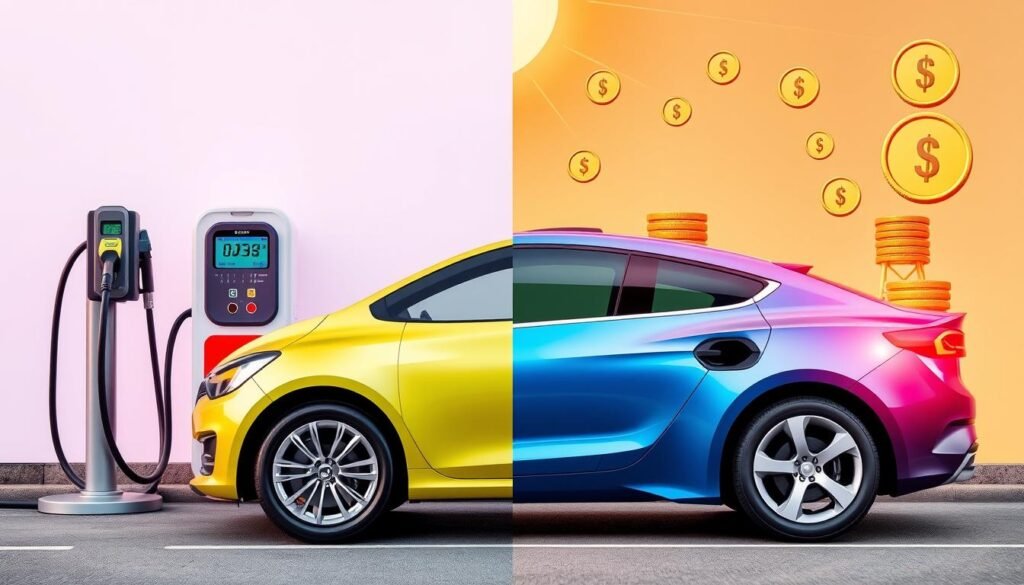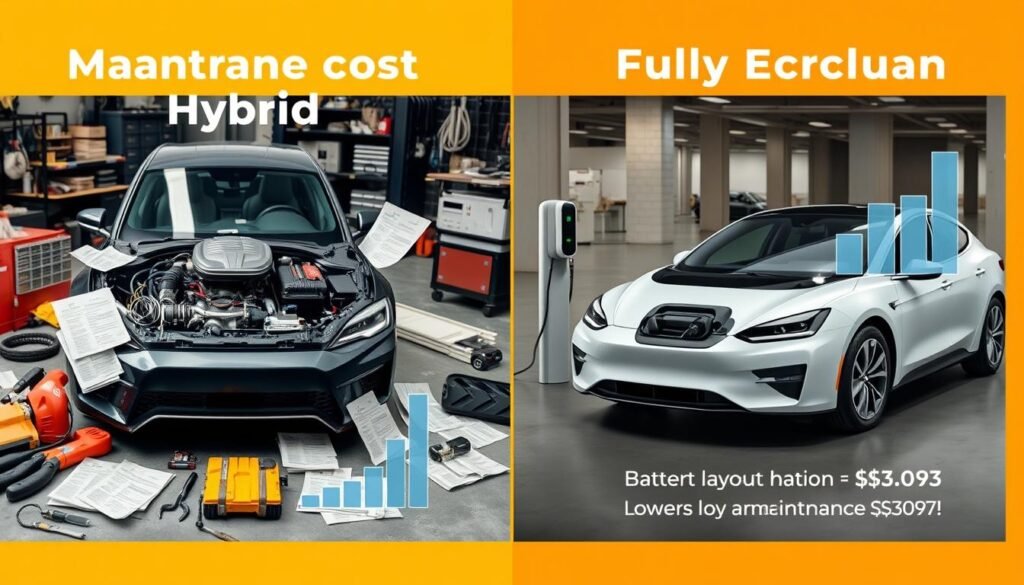The debate between hybrid and fully electric vehicles is growing. Both have their own benefits, but knowing the differences is key. This article will compare hybrid and electric cars in detail. We’ll look at their environmental impact, driving experience, and costs.

Key Takeaways
- Hybrid vehicles combine a traditional internal combustion engine with an electric motor, while fully electric vehicles rely solely on battery power.
- Hybrid cars offer improved fuel efficiency and reduced emissions, but fully electric cars have a lower carbon footprint and are better for the environment.
- Charging infrastructure and range anxiety are key considerations when choosing between hybrid and electric vehicles.
- Hybrid vehicles generally have lower upfront costs but may have higher long-term maintenance expenses due to their dual powertrain systems.
- The resale value and market trends for hybrid and electric vehicles can vary depending on factors such as consumer demand and technological advancements.
Understanding the Basics: Hybrid and Electric Vehicle Technology
The world is moving towards a greener future, and cars are changing too. We now have hybrid powertrains and electric vehicle (EV) battery systems. These changes are making cars more fuel-efficient, better for the environment, and more fun to drive.
How Hybrid Powertrains Work
Hybrid cars use a mix of a regular engine and an electric motor. This setup lets the car choose the best power source, saving fuel and cutting down on pollution. By using both the engine and motor, hybrids offer a smooth ride and better gas mileage than old cars.
Electric Vehicle Battery Systems
Electric cars, on the other hand, run only on batteries. They don’t need a gasoline engine. Thanks to electric vehicle battery technology, these cars can go farther, charge faster, and are more efficient. This makes electric cars a great choice for many people.
Key Technological Differences
The main difference between hybrids and electric cars is how they get power. Hybrids mix a traditional engine with an electric motor for better hybrid powertrains and fuel efficiency. Electric cars, however, use only batteries, making them cleaner and greener.
| Hybrid Powertrains | Electric Vehicle Battery Systems |
|---|---|
| Combines internal combustion engine and electric motor | Utilizes rechargeable lithium-ion battery packs |
| Optimizes fuel efficiency by switching between power sources | Eliminates the need for a gasoline engine, resulting in zero emissions |
| Delivers a smooth and responsive driving experience | Offers improved range, faster charging, and greater overall efficiency |
It’s important to know how hybrids and electric cars work. As we look for greener ways to travel, these technologies are leading the way. They’re changing the car world for the better.
The Pros and Cons of Hybrid vs Fully Electric Vehicles
The debate between hybrid and fully electric vehicles is heating up. Both have their own benefits and drawbacks. Let’s dive into what makes each one special.
Hybrid vehicles are great for saving fuel. They mix a traditional engine with an electric motor. This combo means they get better gas mileage than regular cars. Over time, this can lead to big savings on fuel costs.
- Hybrids are also smoother and quieter, especially in the city. The electric motor helps a lot at low speeds.
- They can go further than just the battery, thanks to the gas engine. This extends their range.
Full electric vehicles are better for the planet. They don’t emit direct emissions and have a lower carbon footprint. EVs run on electricity, making them a clean choice, especially with renewable energy.
- EVs give a more exciting drive. They have instant power and quick acceleration.
- Better battery tech means EVs can now go 200-300 miles on one charge.
Choosing between hybrid and electric vehicles depends on your needs and budget. Both have their own pluses and minuses. Think carefully before you decide.
“The future of transportation is electric, and the choice between hybrid and fully electric vehicles is an important one that will shape the way we move forward.”
Environmental Impact and Carbon Footprint Analysis
Looking at the environmental impact and carbon footprint of hybrid and electric vehicles is key. Both have big benefits, but they differ in how they affect the planet.
Emissions Comparison
Electric vehicles are a big win for the environment because they don’t emit direct emissions. This makes them better than traditional cars and even some hybrids, which still use gas.
Manufacturing Environmental Costs
But, making electric vehicles can harm the environment more. This is because of the energy needed to make lithium-ion batteries. It includes getting and processing raw materials and putting batteries together.
Battery Production and Disposal
Also, dealing with electric vehicle batteries when they’re no longer needed is a big challenge. It’s important to recycle them properly to avoid harming the environment.
| Metric | Hybrid Vehicles | Electric Vehicles |
|---|---|---|
| Emissions during Operation | Reduced, but not zero | Zero direct emissions |
| Manufacturing Environmental Costs | Relatively lower | Relatively higher |
| Battery Production and Disposal | Moderate impact | Significant impact |
The environmental effects of hybrid and electric vehicles are complex. Electric cars don’t emit direct emissions, but making them and dealing with their batteries can harm the environment. Choosing between them depends on what’s most important to you and the planet.

Fuel Efficiency and Operating Costs
Hybrid and fully electric vehicles have their own benefits when it comes to fuel efficiency and costs. Hybrid cars use a mix of a gas engine and an electric motor. This combo boosts power and cuts down on gas engine work, leading to better mileage.
On the other hand, electric vehicles (EVs) run only on battery power. They don’t need gasoline or diesel, so their operating costs are mostly about charging. Charging with electricity is often cheaper than using gas.
| Metric | Hybrid Vehicles | Electric Vehicles |
|---|---|---|
| Fuel Efficiency | Typically higher than gas-powered cars | Highest fuel efficiency with no direct fuel costs |
| Operating Costs | Reduced fuel costs compared to gas-powered cars | Minimal operating costs, primarily based on electricity costs |
| Maintenance Costs | May have higher maintenance costs due to the additional hybrid components | Lower maintenance costs due to fewer moving parts and simpler drivetrain |
The real fuel efficiency and operating costs of hybrids and EVs depend on many things. This includes how you drive, charge, and use the vehicle. Maintenance costs also affect the total cost of owning these cars.
“The fuel efficiency and operating costs of hybrid and electric vehicles are crucial considerations for consumers looking to minimize their environmental impact and save on long-term expenses.”
Knowing the differences in performance and costs helps people choose the right vehicle. It’s about finding what fits their needs, budget, and green goals.

Charging Infrastructure and Convenience Factors
As electric vehicles become more popular, having good charging spots is key. This includes public charging stations and home charging options. It also helps reduce worries about running out of charge.
Public Charging Networks
More public charging spots are being added everywhere. Governments and companies are working hard to build a strong charging infrastructure. This makes it easy to charge your car at malls, offices, and highways.
Home Charging Solutions
Having a charger at home is a big plus for electric car owners. It lets them charge their cars overnight. This means they don’t have to go to public charging spots as often.
Range Anxiety Considerations
Range anxiety is a big worry for electric car users. But, new battery tech and more charging spots are helping. Now, electric cars can go further, and charging is easier to plan.

| Charging Type | Charging Speed | Typical Use Case |
|---|---|---|
| Level 1 (Household Outlet) | Slow (3-5 miles of range per hour) | Overnight charging at home |
| Level 2 (Dedicated Charging Station) | Faster (10-20 miles of range per hour) | Home, workplace, or public charging |
| DC Fast Charging | Rapid (60-200 miles of range per 20 minutes) | Long-distance travel, public charging |
Different types of charging infrastructure are making electric cars more appealing. From public spots to home chargers, it’s all about making driving electric easy and worry-free.
Performance and Driving Experience Comparison
Hybrid and fully electric vehicles have unique benefits in terms of performance and driving experience. Electric motors provide quick acceleration and a smooth ride. This makes driving electric cars more exciting than traditional gasoline cars.
Electric vehicles are known for their performance capabilities thanks to instant torque. This means they can go from 0 to 60 mph fast. They also have a quiet ride and less vibration, making the drive more enjoyable.
| Performance Metric | Hybrid Vehicles | Electric Vehicles |
|---|---|---|
| Acceleration (0-60 mph) | 6-8 seconds | 3-5 seconds |
| Top Speed | 100-120 mph | 110-150 mph |
| Handling and Agility | Good, with some weight penalty | Excellent, due to low center of gravity |
The performance of hybrid and electric cars can differ a lot. It depends on the specific model and its setup. More expensive and performance-focused models can offer even better acceleration and driving experience.
“The instant torque and silent operation of electric motors make for an exhilarating and engaging driving experience that simply can’t be matched by traditional gasoline-powered cars.”
Choosing between a hybrid or electric car depends on what you value most. It’s about performance capabilities, driving experience, range, cost, and how it affects the environment.

Maintenance Requirements and Long-term Costs
Keeping hybrid and electric vehicles in top shape involves several key factors. It’s important to know about the unique maintenance needs and replacement costs for these cars. This knowledge helps smart buyers make informed choices.
Battery Replacement Considerations
Replacing the battery pack is a big concern for hybrid and electric cars. These batteries are made to last many years but will wear out over time. Things like the weather, how you drive, and how often you charge can affect their life span.
Setting aside money for a new battery is a must. A replacement can cost thousands of dollars. This is something to think about when planning to own one of these cars for a long time.
Service Intervals and Requirements
Hybrid and electric cars need different maintenance than gas cars. For instance, they might need oil changes less often but more special care for their electronic parts and charging systems. Knowing and following the maker’s service schedule can help keep maintenance costs down.
Parts and Labor Costs
| Maintenance Item | Hybrid Vehicle | Electric Vehicle |
|---|---|---|
| Battery Replacement | $2,500 – $4,000 | $5,000 – $8,000 |
| Brake Pads | $150 – $300 | $200 – $400 |
| Tire Rotation | $50 – $100 | $50 – $100 |
Parts and labor costs for hybrid and electric cars are often higher than for gas cars. This is especially true for battery replacement. The specialized parts and the need for skilled technicians add to the expense.

“Maintaining a hybrid or electric vehicle can be more complex and costly than a traditional car, but the long-term savings in fuel and emissions can make it a worthwhile investment for many drivers.”
Government Incentives and Tax Benefits
Worldwide, governments are giving incentives and tax breaks for hybrid and electric vehicles. In the UK, these efforts aim to make transportation greener. They help move towards a more sustainable future.
The UK government offers tax incentives for EV owners. They don’t have to pay vehicle excise duty, or road tax. Also, electric and hybrid cars get lower company car tax rates. Businesses can get government incentives for buying electric vehicles. They can deduct the full cost from their taxable profits.
For people buying EVs, the government’s electric vehicle subsidies help a lot. The Plug-In Car Grant can cut the price by up to £2,500. This makes electric and hybrid cars more affordable compared to traditional cars.
| Incentive | Description | Benefit |
|---|---|---|
| Vehicle Excise Duty Exemption | Electric and hybrid vehicles are exempt from paying vehicle excise duty, also known as road tax. | Saves owners hundreds of pounds annually in road tax payments. |
| Reduced Company Car Tax | Electric and hybrid vehicles have lower Benefit-in-Kind (BiK) tax rates for company car drivers. | Significantly reduces the monthly tax liability for employees who drive company cars. |
| Plug-In Car Grant | The government offers a discount of up to £2,500 on the purchase price of eligible electric and hybrid vehicles. | Helps to make electric and hybrid cars more affordable for individual consumers. |
These tax incentives and government incentives make electric and hybrid vehicles more appealing. They help both businesses and individuals in the UK. These incentives are key in making electric vehicles more accessible. They support the country’s shift towards a greener transportation system.
Resale Value and Market Trends
The car world is changing fast, and so are the values of hybrid and electric cars. How these cars hold their value and what the market will be like in the future are key. These factors affect how well these cars will do financially over time.
Depreciation Factors
Hybrid and electric cars have often lost value faster than gas cars. This is due to quick tech changes, worries about battery life, and new rules for green cars. But, as these cars get better and more people want them, their value should stay steady.
Future Market Predictions
Experts think the car market will soon favor hybrid and electric cars more. This is because of tighter pollution rules, more people knowing about their benefits, and cheaper, better models. This change will likely make these cars more valuable when you sell them.
Consumer Demand Patterns
What people want to buy is changing, especially in the UK and other big markets. More folks are choosing cars that are good for the planet and save on gas. This growing interest will make hybrid and electric cars more sought after, affecting their resale value and market trends.
FAQ
What are the key differences between hybrid and fully electric vehicles?
Hybrid cars mix a traditional engine with an electric motor and battery. Electric cars use only an electric motor and a big battery that needs to be charged.
How do hybrid powertrains work, and how do they differ from electric vehicle battery systems?
Hybrid cars use both a gasoline engine and an electric motor. The electric motor helps at low speeds, while the engine kicks in at higher speeds. Electric cars, however, use just a battery to power the motor.
What are the main pros and cons of hybrid vs. fully electric vehicles?
Hybrids are good for fuel and cost less upfront. But, they still have an engine that emits pollution. Electric cars don’t emit pollution and might save money in the long run. Yet, they cost more to buy and might have range issues.
How do hybrid and electric vehicles compare in terms of environmental impact and carbon footprint?
Hybrids are better than old cars but still pollute. Electric cars don’t pollute while driving. But, they pollute when charging, depending on the power source.
How do the fuel efficiency and operating costs of hybrid and electric vehicles compare?
Hybrids are more fuel-efficient than old cars. Electric cars are even better and cheaper to run. But, electric cars are pricier to buy.
What is the state of charging infrastructure for electric vehicles, and how does it affect the driving experience?
Charging stations for electric cars are getting more common. But, finding them can be hard, causing range anxiety. Home charging is easier, but takes longer than filling up a gas car.
How do the performance and driving experience of hybrid and electric vehicles compare?
Hybrids offer good balance between speed and fuel. Electric cars are fast and quiet, thanks to their motors. But, each car’s performance varies.
What are the maintenance requirements and long-term costs associated with hybrid and electric vehicles?
Hybrids and electric cars need less upkeep than old cars. They cost less to maintain. But, electric cars might need new batteries later, adding to costs.
What government incentives and tax benefits are available for hybrid and electric vehicle owners?
Governments offer subsidies, tax credits, and fee breaks for these cars. These help make them more affordable.
How do the resale values and market trends differ between hybrid and electric vehicles?
Hybrids used to hold their value better. But, electric cars are gaining value as the market grows. Battery life, tech updates, and demand will influence their resale value.

